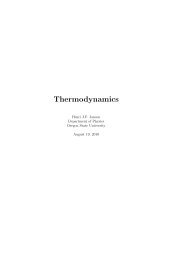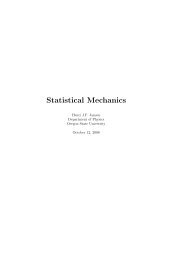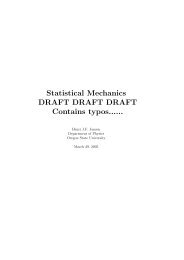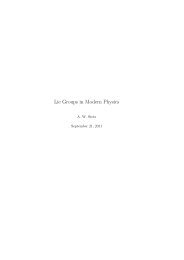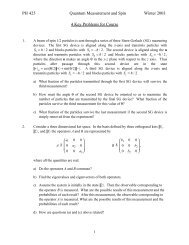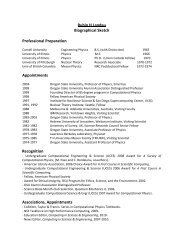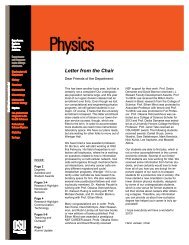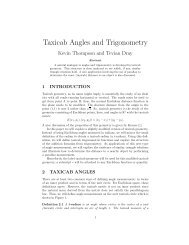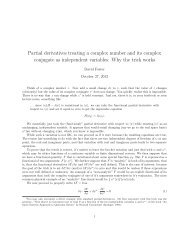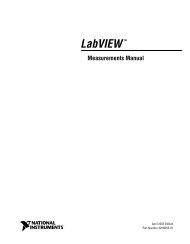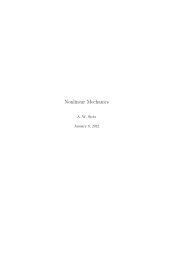Statistical Mechanics - Physics at Oregon State University
Statistical Mechanics - Physics at Oregon State University
Statistical Mechanics - Physics at Oregon State University
Create successful ePaper yourself
Turn your PDF publications into a flip-book with our unique Google optimized e-Paper software.
1.4. AVERAGES. 11<br />
A different way of st<strong>at</strong>ing this basic assumption is th<strong>at</strong> if we wait long<br />
enough, a system will go through all accessible quantum st<strong>at</strong>es. This seems to<br />
be in contradiction with ordinary quantum mechanics, which specifies th<strong>at</strong> once<br />
a system is prepared in a given quantum st<strong>at</strong>e, it will remain in th<strong>at</strong> quantum<br />
st<strong>at</strong>e unless there are external perturb<strong>at</strong>ions (i.e. a measurement). In st<strong>at</strong>istical<br />
mechanics we therefore assume th<strong>at</strong> our system is always in contact with a large<br />
outside world. This makes sense, since it is hard to shield a sample from all<br />
external influences. For example, try to counteract gravity! The <strong>at</strong>oms in a gas<br />
do collide with the walls of the container of th<strong>at</strong> gas, and since the <strong>at</strong>oms in<br />
this wall move in a random way (even <strong>at</strong> zero temper<strong>at</strong>ure due to zero point<br />
motion), the wall adds a small random component to the motion of the <strong>at</strong>oms<br />
in the gas.<br />
This scenario also requires th<strong>at</strong> the system we are considering is chaotic. In<br />
a chaotic system a small difference in initial conditions growth exponentially<br />
fast, and the random, small perturb<strong>at</strong>ions by the walls of the container are very<br />
efficient in causing the system to cycle through all accessible st<strong>at</strong>es. An interesting<br />
question is if all systems are chaotic when they are very large (remember, we<br />
need to take the thermodynamic limit!). In addition, we do not know for sure<br />
wh<strong>at</strong> chaos means in quantum mechanics. In practice, however, all macroscopic<br />
systems seem to obey the laws of thermodynamics.<br />
You run into a number of paradoxes when you want to calcul<strong>at</strong>e the entropy<br />
of the universe in the standard thermodynamical way. The discussion above<br />
shows you, however, th<strong>at</strong> the entropy of the universe is not a conceptually<br />
sound quantity. There is no outside reservoir which can cause the universe to<br />
cycle through all possible st<strong>at</strong>es, and one can argue th<strong>at</strong> the universe is in a<br />
given quantum st<strong>at</strong>e for all eternity.<br />
Take your time!<br />
The argument made in the previous paragraphs allows for a st<strong>at</strong>istical mechanical<br />
description of the solar system. It is an almost closed system, but<br />
there are weak interactions with the external world. Such a description is, of<br />
course, not very useful. The keywords here are long enough. A system can be<br />
trapped in a metastable st<strong>at</strong>e. Glass is a standard example of such a metastable<br />
st<strong>at</strong>e and in order to give a meaningful st<strong>at</strong>istical mechanical description of the<br />
behavior of glass we have to exclude all crystalline st<strong>at</strong>es. If the dur<strong>at</strong>ion of<br />
the measurement would be millions of years we have, of course, to include all<br />
those st<strong>at</strong>es. A solar system is actually a chaotic system and if we wait long<br />
enough all kinds of weird things can happen. A planet could leave and go off<br />
to infinity and beyond. Fortun<strong>at</strong>ely, the time scale of these phenomena is much<br />
larger than the lifetime of a typical star. Therefore, we do not worry about this<br />
happening. Should we?<br />
Truly isol<strong>at</strong>ed?



